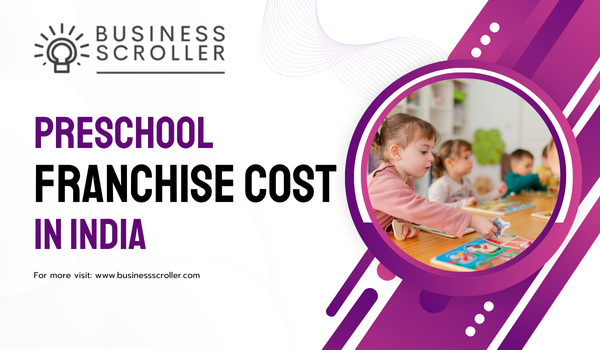The early childhood education sector in India is booming — driven by growing dual-income households, increasing awareness of early learning, and a fast-expanding urban & peri-urban population. If you’re considering getting into the sector, a preschool franchise offers a compelling business opportunity. In this blog post, I’ll walk you through how preschool franchises in India work: the investment required, expected ROI, eligibility criteria, and step-by-step process to apply — combining trusted industry sources plus insights from my experience as a business-franchise content writer.
Why Consider a Preschool Franchise?
There are several reasons why preschools/franchised play-schools are attractive:

- The Indian early childhood education market is projected to grow at a healthy clip.
- A brand (franchise) model gives you an existing curriculum, brand recall, operational support, marketing & admissions systems which reduces risk compared to setting up an independent preschool.
- Fixed-space business, regular monthly fee model (tuition) helps with predictable cash flows.
- For quite a few brands, the entry investment is moderate when compared to other large businesses like K-12 schools or retail chains.
Having said that — success depends heavily on location, quality of operations, brand support, and establishing admissions. As one forum user put it:
“Its very competitive… you need to invest in digital marketing … location, fees and how well you run things.”
So let’s go step-by‐step.
Franchise Model: How Preschool Franchises are Structured
Here’s the basic model:
- The franchisor brand provides: a tested curriculum, brand name & signage, teacher training, marketing support (parent-reach), operations manual, interior design guidelines, and sometimes software/ERP.
- The franchisee (you) provide: the premise (own/lease), required classroom space and outdoor/play area, local staffing, day-to-day management, admissions/acquisition of students, and compliance (safety, licenses etc).
- Revenue comes mostly from tuition/fees from children. Some models may have additional income streams: daycare, extended hours, activity classes, summer camps.
- Commercials vary: one-time franchise fee + initial setup cost + ongoing royalty/marketing contribution (in some models) or sometimes no royalty.
- Example: Some brands offer no royalty models.
- Others charge royalty or percentage of fee revenue.
- Agreement terms typically 3-5 years (renewable). Brand support continues through the term.
Cost & Investment: What you need to budget
Investment varies widely depending on brand, city (metro vs Tier-2/Tier-3), size (student intake capacity), space, and finishes. Below are realistic investment ranges and what they include.
Typical cost ranges
- According to KinderNext, setting up a preschool franchise in India typically costs ₹15–25 lakhs for a full build-out.
- For smaller brands or simpler set-ups, one brand lists costs starting at ~₹6–10 lakhs (2,000 sqft space) for their model.
- Some budget models state investment as low as ₹3.99 lakhs (rural/semi-urban) for smaller set-ups under certain brands.
Cost components typically include
- Franchise/brand fee (one-time). E.g., for top brands like Kidzee, investment breakdown shows infrastructure, brand/fee etc.
- Building/fit-out/interiors: classrooms, play area, furniture, toys, educational kits.
- Outdoor/play area or special activity area (for preschools, parents favour play).
- Staffing: hiring trained early-childhood teachers plus support staff.
- Marketing & initial admission drive.
- Working capital for first few months until admissions ramp up.
- Legal compliance, licensing, safety, etc.
Example numbers
From one brand (Kidzee):
- Investment: ~₹12-25 lakhs depending on location & size. Franchise fee ₹2.5-5 lakhs. Infrastructure & equipment ~₹8-10 lakhs, furniture/toys ~₹4-6 lakhs, marketing & working capital ~₹1-4 lakhs.
From another budget brand (WowKids): - Rural/semi-urban: ₹3.99 lakhs including setup & franchise fee; Urban: ₹4.99 lakhs. (Small size)
Size / space requirement
- Many brands suggest approx 1,500-3,000 sq.ft built-up area (with additional play area) for full preschool.
- Some smaller models may operate on 1,000-2,000 sq.ft especially in semi-urban/rural areas.
Summary Table
| Band | Investment range | Typical city / size |
| Budget model (small town/rural, smaller capacity) | ₹3-5 lakhs | ~1,000-2,000 sq.ft |
| Mid model (town/metro smaller intake) | ₹8-15 lakhs | ~1,500-2,500 sq.ft |
| Full model (metro, large intake) | ₹15-25 lakhs (or more) | ~2,500-3,000+ sq.ft |
Expected ROI & Breakeven
Understanding how quickly you break even and what returns you can expect is critical.
- Industry-insider article: A preschool franchise model might see break-even in ~5-6 months under ideal conditions (strong location, enrolments) but realistic expectations should allow 12-24 months.
- One listing (SmartKidz) for example estimated ROI ~40-50% annually, break-even ~12-18 months for their model (invest ₹6-10 lakhs).
- Another overview: With investment ~₹15-25 lakhs (Kidzee/EuroKids class), ROI period ~2-3 years, monthly profit maybe ₹60,000-₹1.2 lakh (depending on capacity & fees) in good metro location.
Key factors influencing ROI:
- Location & catchment: high-density residential area with young families improves enrolments.
- Fee structure & capacity: Higher tuition + near full enrolment = faster returns.
- Operating costs: rent, staff salaries, marketing eat into margins.
- Brand reputation + marketing/admissions drive.
- Additional offerings: daycare, afterschool programs, weekend activities can boost revenue.
Rule of thumb: If you secure a strong location, manage marketing/admissions well and keep costs under control, you can aim to recoup investment within 1-2 years, and thereafter generate sustainable profits.
Eligibility Criteria & What franchisors look for
When you apply for a preschool franchise, franchisors typically evaluate:
- Your financial ability: ability to invest the required capital + funds to sustain initial months.
- Your business acumen: willingness to run an education-business, understand local market, parent-community relations.
- Access to a suitable premise: either you have a lease/own building in a good location (residential neighbourhood/community) or can secure one quickly. E.g., many brands require 1,500+ sq.ft in a residential area.
- Commitment to the brand standards: staffing, safety, play area, curriculum, audits.
- For some brands, minimum educational qualification may be preferred (though franchisees often partner with someone with strength in education). Example: SmartKidz requires minimum graduate educational qualification.
- Your local network and marketing drive: admissions will depend a lot on local reputation and parent referrals.
Steps to Apply: Your roadmap
Here is a step-by-step process to apply and launch a preschool franchise.
- Research & shortlist brands
- Compare multiple preschool franchise brands: investment, royalty/fee, support, track record.
- Ask for franchise disclosure pack: what support is given, what your obligations are, minimum enrolment targets, territory rights, renewal policy.
- Self-assessment & location planning
- Check your budget, your ability to commit time and effort.
- Identify potential locations: residential areas with young families or upcoming housing developments, accessible and safe.
- Estimate rent, utilities and local competition.
- Make initial contact & enquiry
- Visit brand websites (many have franchise enquiry forms) and fill with your details (investment capacity, city/location, business profile).
- Brands will contact you to share their franchise model, investment details, support offered.
- Submit formal application & evaluation
- Provide your credentials: identity, financial proof, business history (if any), proposed location details.
- Franchisor will do feasibility check of your proposed site, local demand, demographic suitability.
- Commercial negotiation & agreement signing
- Once approved, you will receive agreement covering franchise fee, royalty (if any), term (3-5 years), territory rights, set-up schedule.
- Review agreement carefully — negotiate terms like royalty percentages, territory exclusivity, renewal costs.
- Pay franchise fee and sign agreement.
- Set up centre
- Lease/secure the building, complete interiors, play area, furniture, educational kit as per brand guidelines.
- Get required licenses/permissions (local business permit, maybe local ECE regulations).
- Recruit teachers/staff, train them via brand’s training programme.
- Marketing & admission drive – launch campaign to enrol first batch of students.
- Ensure safety, child-friendly environment, signage, branding as per franchisor.
- Launch & operate
- Open doors, commence classes.
- Monitor admissions, retention, parent-engagement, curriculum delivery.
- Use brand’s support: marketing, software systems, parent-app, etc.
- Track performance monthly: enrolments, fees collected, cost control, and plan for additional revenue streams (e.g., daycare or extra-curricular).
- Review & scale
- After stable operation, consider expanding capacity (additional rooms) or opening second location.
- Evaluate key metrics: occupancy rate, fee per student, staff cost, rent cost — optimize for good margin.
Additional Practical Tips & Red Flags
Tips:
- Location is key: In preschool business, parents want convenience and trust. Being in a safe, easily accessible residential area helps.
- Brand vs cost: While budget investment is tempting, a weaker brand may struggle to attract parents. A strong brand means you may command premium fees and enrol faster.
- Marketing before you open: Build awareness early (3-4 months before opening) — tours for parents, open house, social media, local leaflets.
- Multiple revenue streams: Besides regular fee, consider midday daycare, summer camps, weekend activity clubs.
- Quality staff & environment: Word of mouth matters a lot in preschools. If parents are happy, retention is high.
- Control costs: Rent, staff salaries, utilities can eat into margin — model your P&L carefully.
Red Flags:
- If the franchisor promises unrealistically high ROI or break-even in very short time without supporting data.
- Hidden royalty or marketing fees that are not clearly disclosed.
- Very long lock-in periods with heavy penalties for early exit.
- Franchise requiring you to buy expensive “mandatory” items or kits without transparent cost breakdown.
- The location is not vetted or you are forced into a suboptimal site.
Final Thoughts
A preschool franchise in India offers a solid business opportunity in the education sector with potentially moderate investment and a path to sustainable returns — provided you pick the right brand, secure a strong location, deliver quality operations, and drive admissions effectively. To recap:
- Investment generally ranges from ₹3-5 lakhs (very small/rural model) up to ₹15-25 lakhs or more for metro, large capacity models.
- Expected break-even often in 12-24 months, with good ROI thereafter.
- Eligibility emphasises your investment capacity, location selection, business acumen, and commitment to brand standards.
- The steps: research → shortlist brands → submit enquiry → site evaluation → agreement → set-up → launch → operation.

Shashi Kant is the Founder and Editor of BusinessScroller.com, a leading platform for business insights, finance trends, and industry analysis. With a passion for journalism and expertise in business reporting, he curates well-researched content on market strategies, startups, and corporate success stories. His vision is to provide valuable information that empowers entrepreneurs and professionals. Under his leadership, BusinessScroller.com has grown into a trusted source for in-depth articles, customer care guides, and financial expertise.


